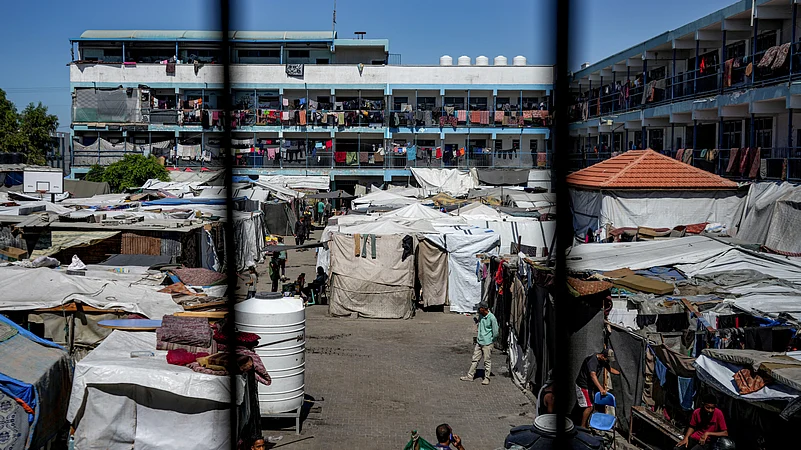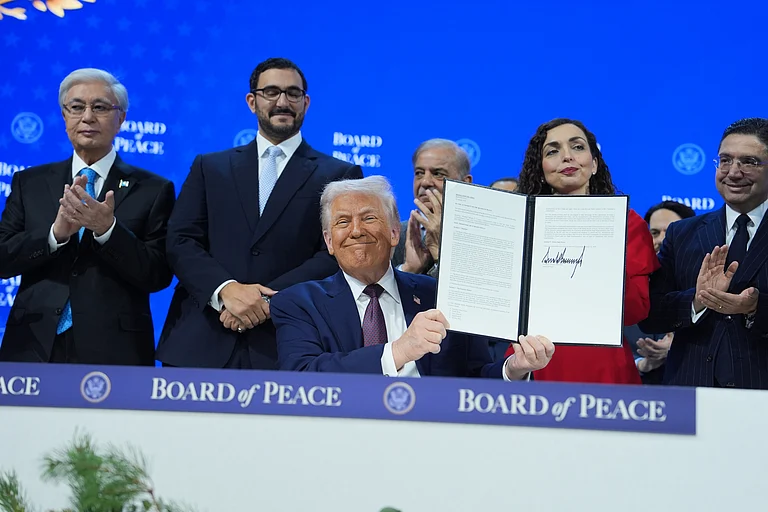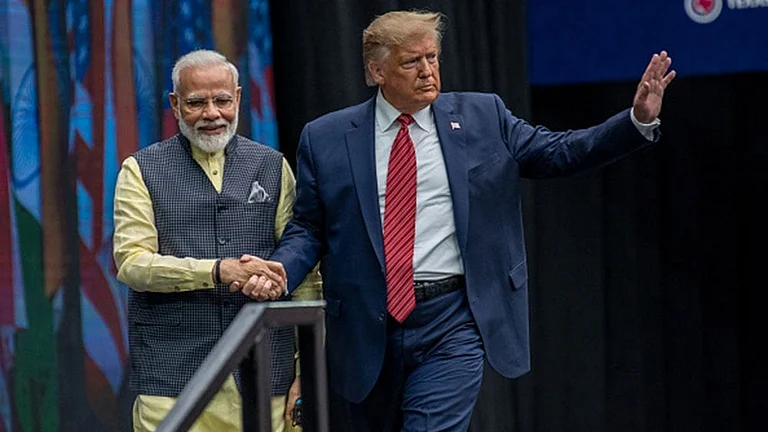
US President Donald Trump called on all sides to "move fast" ahead of indirect peace talks between Hamas and Israel in Cairo, saying “time is of the essence or massive bloodshed will follow.”
Despite Trump’s order to “immediately stop the bombing,” Israeli air strikes continued in Gaza as both delegations prepared for what could be the most consequential negotiations since the war began.
US President Donald Trump has called on all parties involved in efforts to end the Gaza war to "move fast" as mediators prepare to meet in Egypt on Monday for indirect peace talks between Hamas and Israel.
The discussions follow Hamas’ partial acceptance of a 20-point US peace plan, including provisions for freeing hostages and transferring Gaza’s administration to Palestinian technocrats. The group, however, has sought negotiations on several other issues and made no mention of key demands such as disarmament or withdrawing from Gaza’s future governance.
Writing on social media that talks had been "very successful", Trump said: "I am told the first phase should be completed this week, and I am asking everyone to move fast." He warned that "time is of the essence or massive bloodshed will follow."
Earlier, Trump told reporters he believed the hostages would start being freed "very soon". Asked about potential adjustments to his plan, he replied, "we don't need flexibility because everybody has pretty much agreed to it, but there will always be some changes." He added: "It's a great deal for Israel, it's a great deal for the entire Arab world, Muslim world, and world, so we're very happy about it."
Despite Trump’s appeal to "immediately stop the bombing" on Friday after Hamas responded to the proposal, Israeli air strikes continued through the weekend. Israeli government spokesperson Shosh Bedrosian said on Sunday that "while certain bombings have actually stopped inside of the Gaza Strip, there's no ceasefire in place at this point in time."
She added that Prime Minister Benjamin Netanyahu had ordered forces "to fire back for defensive purposes... if there is a threat to their life in the battlefield in Gaza."
Reports from Gaza indicated continued Israeli air and tank strikes overnight, which destroyed several residential buildings in Gaza City. A BBC correspondent near Kibbutz Be’eri in southern Israel reported hearing explosions and seeing smoke plumes early Sunday.
Gaza’s Hamas-run health ministry said another 65 people were killed in the 24 hours leading up to midday.
US Secretary of State Marco Rubio told CBS that airstrikes needed to halt to enable the hostage release. "You can't release hostages while there's still bombardments going on... that has to stop, but you also have to work through the other logistics," he said. "We want to get the hostages out as soon as possible."
The 20-point peace plan calls for an immediate end to hostilities and the release of 48 hostages—20 believed to be alive—in exchange for hundreds of detained Gazans. Netanyahu said in a televised address on Saturday that he expected to announce hostage releases "in the coming days."
According to Bedrosian, the prime minister has "made it clear that in an agreement with the Trump administration, talks will be confined to a few days maximum."
Netanyahu has ordered the Israeli delegation to depart for Monday’s talks in Cairo. A Hamas delegation led by chief negotiator Khalil al-Hayya—who survived an Israeli assassination attempt in Doha last month—is also expected to attend.
US special envoy Steve Witkoff, Trump’s son-in-law Jared Kushner, and Qatari foreign minister Sheikh Mohammed bin Abdulrahman Al Thani will join the negotiations, which are being described as potentially the most decisive since the war began.
Hamas’ response to the plan surprised many Palestinians after earlier signs it would reject or heavily condition its acceptance. Instead, the group’s statement omitted its traditional "red lines," a move widely viewed as the result of pressure from Qatari, Egyptian, and Turkish mediators.
A senior Palestinian official told the BBC that mediators had convinced Hamas to reserve contentious issues—including disarmament, post-war governance, and other political demands—for the negotiation table.
Many Gazans remain wary of Hamas’ tactical flexibility, warning that each day of delay deepens the humanitarian toll. Still, Hamas’ decision to participate without explicit conditions is seen as an acknowledgment of its weakened position after nearly two years of war.
Asked what would happen if Hamas insisted on staying in power, Trump told CNN’s Jake Tapper the group would face "complete obliteration."
Trump also posted that Israel had agreed to an initial withdrawal line in Gaza—part of a phased pullback of Israeli forces.
The withdrawal map published by Trump would initially exclude nearly 900,000 Palestinians from returning home, according to Gaza population data. The proposed lines cut out Rafah in the south, Beit Hanoun and Beit Lahia in the north, nearly a quarter of Gaza City, and half of Khan Younis and Deir al-Balah in the centre and south. Hamas had rejected a similar map in earlier negotiations this year.
The current conflict began after Hamas’ 7 October 2023 attack on southern Israel, which killed around 1,200 people and saw 251 taken hostage. Since then, 67,139 Palestinians have been killed by Israeli military operations, according to Gaza’s health ministry.
Israel continues to bar international journalists from entering Gaza independently, making on-ground verification of claims from both sides difficult.
As negotiators gather in Egypt, the world watches closely, hoping this fragile round of diplomacy can finally open a path toward ceasefire and an end to one of the region’s deadliest conflicts.
(with inputs from The Guardian)






























